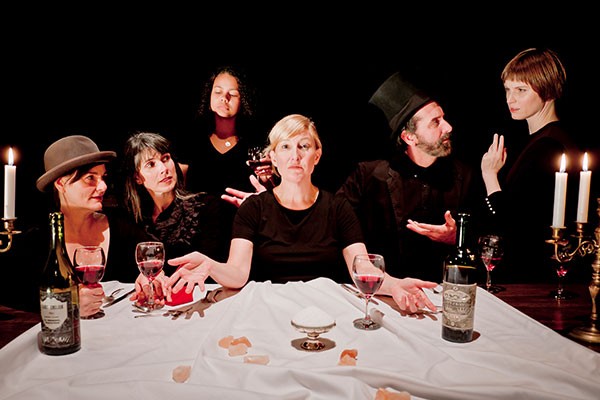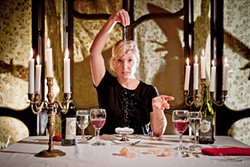Hamlet
January 9-20
Neptune Theatre Scotiabank Stage
1593 Argyle Street
$28-$37
neptunetheatre.com
Nearly four years ago, Ken Schwartz was at The Bus Stop Theatre watching a production of The Pillowman—a Martin McDonagh play cast gender-blind with Jackie Torrens, Mary-Colin Chisholm, Theo Pitsiavas and Matthew Lumley—when he was struck by a vision.
"I had this image of Jackie as an Edwardian servant and she'd set fire to all the drapes in the dining room," he says. "And the whole place was on fire, and she was very calmly standing in front of it."
After the performance, he asked Torrens if she'd like to co-produce and star in Hamlet, which he would direct. She was in. The production opens this Wednesday, January 9, on Neptune's second stage.
"That door has never been open to me, playing Hamlet," says Torrens, with Schwartz on a rickety Skype connection from the Ross Creek Centre for the Arts. A sprawling mountaintop artistic incubator and performance space in Canning, Schwartz lives there and runs, with his wife Chris O'Neill, Two Planks and a Passion Theatre. (Hamlet is a production of his and Torrens' company Below the Salt.)
"We're in a new period of time right now where story is changing and how story is being told is changing, and growing up as an actor who happens to be female, for most of my career I've been assigned roles for females," Torrens continues. "Other roles have been shut to me. Now we're in a period of time where there's this exciting notion where no longer are stories going to be niched. Stories that feature female protagonists or a protagonist of colour, they have been niched up to this point—to being a 'woman's story' or a 'Black story' or a 'gay story'—I think we're moving beyond that. And recognizing that the protagonist is universal, no matter what they look like."
"When you stage a classic piece of work, the first question you have to ask yourself—and it's obvious—is 'Why? Why do it again?'" says Schwartz. "It's been done a million times, it'll be done another million times—what do you have to say that's slightly interesting to bother doing it again?"
For their millionth and one production, it's in the staging: An Edwardian dining room, in which Hamlet's characters are employees.
"The fact that the players are the servants, that the performance of the play is actually a huge transgression—it's like art as guerilla warfare, almost—interfering with an ordered, restricted universe is something that really appealed to me," says Schwartz. "And also just the physical idea that we're all 'around' this table, and that it's very immersive. Often Shakespearean characters are not talking to each other, they're talking to you in the audience."
These characters in particular will be talking directly into 16 faces each performance—that's how many seats are available, of the room's 195-person capacity, on the stage, in the set itself.
"As a director what I want to do is do the Hamlet where people forget what's going to happen next," says Schwartz. "You experience the play not as someone who goes, 'Oh yeah, this is the part where that happens,' but where you literally don't know how it's going to happen. This concept, and the way we're approaching it, allows us to do that."
Torrens dimisses the idea that a woman as Hamlet is trendy stuntcasting (and anyway the tradition dates back to the 1800s).
"When I sat down and looked at Hamlet and the journey this character goes on—which is about dealing with a grave injustice that exists on a personal level and a political level—nothing to me in that journey had anything to do with gender whatsoever," she says. "If I read Hamlet first as an audience member, there's nothing in Hamlet's heart that beats that I can't relate to as a human being, and that goes the same for me as an actor. There's nothing Hamlet has to deal with that I haven't had to wrestle with in some form or fashion in my own heart as a human being."
"Precepts and styles in the theatre come and go," says Schwartz. "This idea that the theatre needs to be 'realistic' versus something else. Theatre is not cinema, theatre is a collaborative art form of the imagination in which it's not about what you look like, but about the story that you're telling."
"When we did Pillowman, we weren't doing it as 'the feminist version of Pillowman.' And when we took on Hamlet, we didn't think, 'And now it's the feminist version of Hamlet,'" says Torrens. "I just happen to be playing Hamlet."
In this cast of six there's a lone male, Matthew Lumley, but Torrens points out even his appearance is out of the ordinary: "All the rules are being broken in that way, casting-wise: Matt is playing Polonius, he's not an old man; I'm playing Hamlet, I'm older than Hamlet is traditionally; Micha Cromwell is in her 20s and she's playing my best friend; Genèvieve Steele and Burgandy Code, who are my peers, they're playing my parents," she says. "We're not paying attention to any of that, it's just actors acting roles."
"The gender is really not the concept," says Schwartz. "It's this concept of class hierarchy in a really ordered universe and how the performance of the play—which we discover is being performed for a certain reason by these servants—starts to break down that ordered universe and make it very chaotic."
"What do you do when a corrupt individual has seized the reins of power and it seems like the whole world is going to go along with this new regime and it feels like you're the only one" who knows what's actually up, asks Torrens. "Hamlet's dealing with a grave injustice that everyone else has decided to cover up and it doesn't exist, and that feeling of not being able to stand that—I just feel like I can relate to that a lot."
Though Torrens won't actually be burning down Neptune, by producing herself in this part, she's stoking the flames of change one soliloquy at a time.
"If we start to tell stories where we're doing away with traditional notions of who gets to play a character and what story it is they tell, then I think we're right now at the precipice of story being blown wide open of who can play what," she says. "Actors who've been shut out from these roles before, what they can then bring to these roles that have been traditionally denied them, and how that in the future is going to alter story."
"What happens when you have the rise of a demagogue? You know this person is terrible, you know this person is wrong every day, but what do you do as an individual? What's your responsibility, what can you do?" says Schwartz. "Those are the overarching concepts and questions that the work is asking. When people come to see it, for those reasons and for how we cast it, it wouldn't look like a production of Hamlet from 25 years ago. That's safe to say."
Tara Thorne is The Coast's arts editor.


